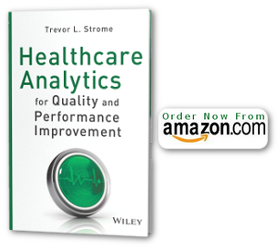Analytics – not just for management anymore!
In a busy Health Care Organization (HCO), who really cares about performance metrics and analytics? Who should care? Sure, HCO executives and unit managers probably review the reports you produce or access the dashboards you’ve built. But, are the analytics getting through to those who matter most – the clinical staff?
Most HCOs committed to improving quality through analytics have multiple ways of distributing performance information. These dissemination methods typically include electronic dashboards, “passive” reports distribution, and “quality boards” in high-traffic areas where the latest performance statistics can be posted for all staff to see. Particularly relating to clinical staff, the question is, “are they looking, and do they care?”
Front-line staff responsible for data quality
The clinical staff of any HCO are very busy providing the highest quality care possible. This leaves little time for perusing performance information that is seemingly not relevant to them. It is the clinical staff, however, that are vitally important to the success of any analytics-driven initiative.
Clinical staff are directly responsible for the quality of data available for analytics tools. The quality of data in source systems (such as Electronic Medical Records) is directly related to how accurately information is entered into those system by the clinical staff; these source systems of course feed into analytics repositories. In order for source data to be high-quality to make analytics meaningful, information needs to be entered accurately and as per standardized workflows and processes; this requires diligence and effort on the part of clinical staff.
Clinical staff are are also key stakeholders in the use of analytics for process and quality improvement initiatives. When processes and workflows change (as a result of analytics-driven initiatives), front-line staff are most often directly affected; it is they who must overcome resistance to change and be willing to experiment with new ways of delivering healthcare. Because of this, analytics are critically relevant to front-line staff within healthcare organizations. As healthcare analytics and quality improvement professionals, our job is to ensure they understand this!
Analytics evangelism
Bringing analytics to the front-line requires more than electronic dashboards and quality boards. Analytics requires a touch of evangelism to be brought to the front-lines. The more clinical staff understand how analytics impacts their work-lives (through quality improvement initiatives, etc), the more they are likely to understand the impact of their daily practices on data and analytics (and how those impact them).
If you want analytics to enable change, sometimes your analytics needs to be “active” – beyond the dashboard, report, or quality board. Try to find new and interesting ways to get in front of your clinical staff to discuss performance data. There are plenty of opportunities to address groups of staff, such as staff meetings, education days, and other forums. This will allow an engaging discussion of the purpose and outcomes of analytics initiatives, and more importantly, will communicate the relevance and importance of the data to and what it means to the staff and delivery of quality patient care.
Driving analytics innovation
In my experience, I have found getting directly in front of staff to discuss how analytics is used for quality improvement has lead to very stimulating conversation, and has increased the staff’s understanding of how and why we’re using information. Such face-to-face discussions actually drive innovation in analytics; many ideas from staff have directly contributed to new metrics being monitored and led to improved and more user-friendly ways to communicate information with staff.
The bottom line is that meaningful communication and collaboration with front-line staff is essential to making analytics relevant within a healthcare organization. A little bit of “old-school” face-to-face interaction will definitely lead to increased interest and participation in “new school” healthcare transformation efforts.

{ 0 comments… add one now }